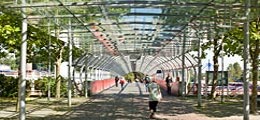CeBiTec Kolloquium
und
Physikalisches Kolloquium
| date | Monday, May 23rd 2011, 17 c.t. | |
| location | H 6, University Main Building | |
| speaker | Prof. Henry HessDepartment of Biomedical Engineering | |
| title | Using biomolecular motors for smart dust, active self-assembly and non-fouling surfaces | |
| Biomolecular motors, such as the motor protein kinesin, can serve as biological components in engineered nanosystems. A proof-of-principle application is a “smart dust” biosensor for the remote detection of biological and chemical agents, which is enabled by the integration of recognition, transport and detection into a submillimeter-sized microfabricated device. The development of this system has revealed a number of challenges in engineering at the nanoscale, particularly in the guiding, activation, and loading of kinesin-powered molecular shuttles. Overcoming these challenges requires the integration of a diverse set of technologies, and continues to illustrate the complexity of biophysical mechanisms. Biomolecular motors also introduce an interesting new element into self-assembly processes by accelerating transport, reducing unwanted connections, and enabling the formation of non-equilibrium structures. The formation of nanowires and nanospools from microtubules transported by kinesin motors strikingly illustrates these aspects of motor-driven self-assembly. Finally, the controlled placement of kinesin motor proteins requires a background of perfectly nonfouling surfaces. This has led us to tackle the long-standing challenge of designing surfaces which are resistant to protein adsorption with new experimental and theoretical approaches. | ||
| host | Prof. Dr. Armin Gölzhäuser |



